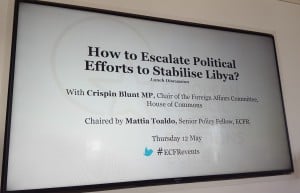By Sami Zaptia.

London, 12 May 2016:
The European Council on Foreign Relations (ECFR) in London hosted a discussion on ‘’How to escalate . . .[restrict]political efforts to stabilise Libya?’’ by Crispin Blunt, Conservative MP and Chair of the House of Commons Foreign Affairs Committee.
The Foreign Affairs Select Committee report on Libya will be out before 6th July, he promised. It will be out before the Chilcot Inquiry report on Iraq, Crispin Blunt joked, lamenting that the Libya report could have benefited from the Chilcot report if it been released earlier.
Blunt also lamented the fact that British Prime Minister David Cameron refused to appear before the Libya Committee to give evidence in person.
Blunt said he was surprised, but pleased, at the change of initial policy on sending troops to Tripoli to safeguard key locations in the capital for the entry of the GNA. This was subsequently watered down to just sending troops to safeguard the GNA in the Abu Sitta Naval Base and Mitiga airport. At the last moment he confirmed that sending troops was altogether abandoned as a bad idea.
The policy would have surely attracted confrontation from the many enemies of western forces in Libya he said. The other policy that now seems to have been abandoned was that once the GNA entered Tripoli it would invite the help of foreign forces to help it against IS. The British government now deny that these ever were policy options, he added.
Blunt noted that there is ‘’confusion’’, ‘’uncertainty’’ and ‘’different agendas’’ on military and political policy in Libya. On the other hand, he praised UNSMIL head Martin Kobler and the ‘’five key’’ ambassadors in Tunis working with a ‘’high level of coordination’’ on Libya policy. Blunt seemed to suggest that they were working semi independently away from their governments making policy on Libya.
Blunt confirmed the view that British and French Special Forces were helping Hafter in the east take on IS in Benghazi. He said RAF flights to Libya had been confirmed y a minister which were helping British Forces there.
However, Blunt insisted that military force in Libya must be linked to clear policy objectives. A wide objective would need ten times the estimated budget. It won’t be ‘’nice and cheap’’ thinking Libya will pay for it, he added.
Politics must be put on top of the agenda, before military activity. He was glad that the GNA seems to have realized this and that a political solution will take time. The popular climate in Libya has changed, he explained. People are fed up and that is why he thinks 80 percent of the militias in Tripoli supported the GNA. Militias are now seen as the source of instability.
There is a different dynamic in eastern Libya. There is an agenda by Hafter and his supporters in the east he noted, and the danger is that outside states start to invest in people or groups – rather than the GNA and larger interest. Some countries including France and Egypt maybe playing a twin track policy in Libya, he added.
Asked by Libya Herald on the need for a policy of DDR for Libyan militias which the GNA was dependent on for protection in Tripoli, Blunt admitted that in 2012 DDR was a top policy that has since fallen away.
He admitted that Libya had to ‘’buy’’ itself out of the militia problem. Militias are in business because they are getting paid. They must be presented with the choice of either enrolling into a unified army or getting a lower paying ‘’pension’’.
Blunt said that peace in Northern Ireland was bought in many ways and that there is a rapidly reducing opportunity for Libya to buy itself peace. The militia issue is a ‘’nettle that has to be grasped’’ he insisted. The issue is how and when a DDR strategy will be implemented.
In response to a question regarding offering international help to a GNA limited in implementation capability as was the case after 2011, Blunt said that he preferred a ‘’slow and messy’’ Libyan process that it being perceived as western run. The GNA would otherwise lose legitimacy.
Asked if the GNA was to fail and Russia was to go it alone with Hafter in the east of Libya, Blunt said there is no plan B. He said that the GNA has to create sufficient political agreement from the Libyan people. There is no other choice, he stressed. Failure of the GNA would be worse for all sides – including a possible alternative Russian agenda. [/restrict]









